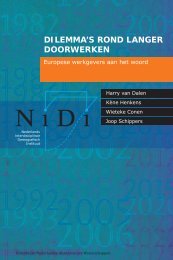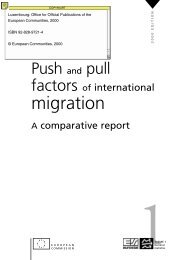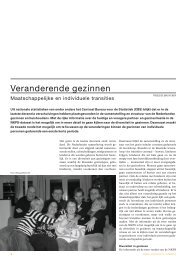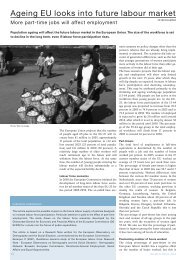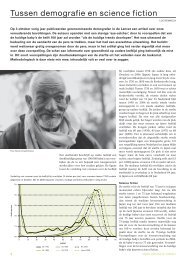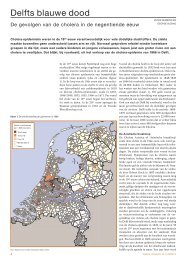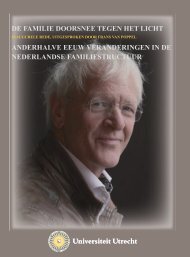ever-changing societal and normative context <strong>of</strong> behavior and the need to adopt a long-termperspective.Suggesting research topics is one thing, coming up with convincing results is quite another.<strong>Frans</strong>’s results appeal to a wide audience (going beyond historians and demographers)because <strong>of</strong> his mixed methods approach. His hypotheses are well-grounded in the literature,including 19 th century medical reports, government enquiries, ethnographic material, andegodocuments. They are tested on representative datasets, <strong>of</strong>ten the result <strong>of</strong> painstaking datacollection, in many cases by <strong>Frans</strong> himself. Finally, the analytic handling <strong>of</strong> the data hasalways been –as far as I can see– <strong>of</strong> great quality. His dissertation on marriage and divorceshows his great love for history and literary sources in the detailed analysis <strong>of</strong> contemporarydebates between politicians, church <strong>of</strong>ficials, social reformers, and eugenicists on the ‘proper’age to marry. Popular attitudes to marriage are studied through regional customs, proverbsand may other sources. In the same book, however, <strong>Frans</strong> tackles the regional variation inmarriage in a linear regression model, and goes on to study remarriage hazard ratios in one <strong>of</strong>the first event history analyses to be performed in Dutch historical demography (Van <strong>Poppel</strong>,1992). Another example <strong>of</strong> his sophisticated mixed methods approach is his study with HugoRöling on contraceptive behavior <strong>of</strong> medical doctors, in which they combined a history <strong>of</strong>debates on contraceptive techniques with family reconstitutions <strong>of</strong> a large number <strong>of</strong> medicalpr<strong>of</strong>essionals in Holland. They showed that although doctors were clearly pioneers <strong>of</strong> birthcontrol in their private lives, concerns for the respectability <strong>of</strong> their pr<strong>of</strong>ession preventedthem from openly advocating neo-Malthusianism (Van <strong>Poppel</strong> and Röling, 2003).The success <strong>of</strong> <strong>Frans</strong>’s research stems –in part– from his fine nose for data. In his earlier work,historical census data still played a large role, but <strong>Frans</strong> soon cast his net wide to includesources as diverse as cause-<strong>of</strong>-death statistics, collections <strong>of</strong> marital records (e.g. Gouda),automatically reconstituted family trees (GenLias), archives <strong>of</strong> churchyards, interviewswith priests and parishioners, and complete life course reconstructions <strong>of</strong> regional or evennational samples <strong>of</strong> individuals. This could imply, as in the case <strong>of</strong> the Historical Sample <strong>of</strong>the Netherlands, a long-term involvement in organization, quality control and dissemination<strong>of</strong> the specific data infrastructure.Agenda-settingHis success can also be attributed to his ability to collaborate across disciplines, generationsand frontiers. Until recently, historians kept very much to themselves, in terms <strong>of</strong> data andmethods. The ‘collaborative model’, as shown by <strong>Frans</strong>, expanded the scope and rele<strong>van</strong>ce <strong>of</strong>historical work through the fine-tuning <strong>of</strong> hypotheses and results, incorporating specializedknowledge (e.g. on statistical modeling), and allowing for large scale or comparative research.A recent example is the special issue by <strong>Frans</strong> and Tommy Bengtsson in Explorations inEconomic History (2011) on change over time in social class differences in child and adultmortality. They refute conventional wisdom by showing that, for a long time, high incomeand high social status were not consistently translated into health benefits. Even more recentis his cooperation with Spanish authors (Van <strong>Poppel</strong> et al., 2012) who had demonstrated thatchild survival affected fertility decisions in pre-transition populations. By replicating their18
approach on Dutch data, <strong>Frans</strong> showed on the one hand that this association appears to beuniversal, on the other hand that the effects differed strongly by social and religious group,reflecting strong socio-cultural differences in self-agency.In all these aspects <strong>of</strong> historical-demographic research, <strong>Frans</strong> was ahead <strong>of</strong> the rest. Yet, heclearly never was ‘alo<strong>of</strong>’ – he never distanced himself from the other players in the field.As supervisor <strong>of</strong> trainees, peer reviewer, commentator at conferences, co-promotor <strong>of</strong> Ph.D.students, editor <strong>of</strong> journals, board member <strong>of</strong> organizations and in many other ways, <strong>Frans</strong>has encouraged others to take up the fascinating subject <strong>of</strong> family and population history. Tosummarize: <strong>Frans</strong>’s track record <strong>of</strong> agenda-setting amounts to exploring promising researchfields, demonstrating the added value <strong>of</strong> mixed methods, investing in data infrastructure, andsetting high quality standards.However, <strong>Frans</strong> is only human. There are still areas he has hardly touched upon. Actually,some fields may have been relatively underdeveloped by the concentration <strong>of</strong> <strong>Frans</strong> and otherhistorical demographers on the topics mentioned above. Firstly, <strong>Frans</strong> has dedicated most <strong>of</strong>his energy to the demography <strong>of</strong> the Netherlands in the data-rich period after 1850. There arestill many issues to be addressed in the earlier period. For instance, when and how did thepositive association between wealth and family size disappear? Secondly, although studieson migration are not absent in <strong>Frans</strong>’s publication list, he has refrained from systematicallylinking migration to other aspects <strong>of</strong> demography, such as fertility or mortality. Finally, <strong>Frans</strong>is not a ‘system-builder’. In most <strong>of</strong> his work, he seems to studiously avoid holistic conceptssuch as ‘demographic regime’ or ‘family system’. Also, he is not engaging (probably forgood reasons) in debates with, for instance, those economists who seek to explain the greattransformation <strong>of</strong> the nineteenth century in the form <strong>of</strong> a Unified Growth Theory that linksthe industrial revolution to fertility and mortality decline.What next?Although <strong>Frans</strong> will hopefully remain active for a very long time, the occasion for which thisessay was written begs the question: What next? What are now the challenges for historiansand demographers? For historians, <strong>Frans</strong> <strong>of</strong>fers, firstly, a puzzling array <strong>of</strong> subtle differencesin behavioral responses between occupational and religious groups and, secondly, a set <strong>of</strong>compelling questions on long-term change. Referring to the first, the next generations willhave to dig deeper still. Thus, we need to find out how the assumed differences in attitudesand outlook between Catholics and (<strong>Liber</strong>al) Protestants have emerged, and how they couldpersist over time. What is the role <strong>of</strong> social control mechanisms in this respect? Also, thedistinctions by socio-occupational group identified by <strong>Frans</strong> may hide other, possibly evenmore important fissures in society. How does the picture change once we compare lifecourses by education, income, property, or even expectations <strong>of</strong> inheritance? Referring to thesecond, <strong>Frans</strong>’s studies suggest that change in demographic behavior is more influenced bysocio-economic factors than by cultural/ideational ones, thus adding to the growing critique<strong>of</strong> diffusionist models. In a recent article (Schellekens and Van <strong>Poppel</strong>, 2010) it is arguedthat mortality decline coupled with the rise in real wages are the most important factorsin explaining the Dutch fertility decline before 1940. However, it is still not clear how the19
- Page 2 and 3:
- Page 4 and 5: Publication:Nederlands Interdiscipl
- Page 6: Religious and socio-economic determ
- Page 10 and 11: 8IntroductionOn 27 December 2012 Fr
- Page 13: Part IScope and Impact
- Page 17: of further aspects of marriage, div
- Page 22 and 23: supposed ‘quality-quantity trade-
- Page 24 and 25: The impact of a historical demograp
- Page 26 and 27: and theoretical contributions, but
- Page 29 and 30: Part IIData and Methods
- Page 31 and 32: Early in his career, Frans was co-a
- Page 34 and 35: 32Sex ratios in global historical p
- Page 36 and 37: appeared early, as in some southern
- Page 38 and 39: available on female labour in India
- Page 40 and 41: Kurosu, Satomi (1994), Sex ratios a
- Page 42 and 43: adjustments and reactions are the s
- Page 44: the extent of fertility recuperatio
- Page 47 and 48: 25 Years of collaboration: The Hist
- Page 49 and 50: Since 1995 numerous volunteers have
- Page 51 and 52: Part IIIFertility and Nuptiality
- Page 53 and 54: Figure 1. GDP per capita, unemploym
- Page 55 and 56: while the GDP continued to grow som
- Page 57 and 58: Map 1. Communities covered by the C
- Page 59 and 60: Above all, our empirical study demo
- Page 61 and 62: The proportion of consanguineous ma
- Page 63 and 64: Earlier studies have shown that par
- Page 65 and 66: Verzuiling (‘pillarisation’), o
- Page 67: The crumbling of the Roman Catholic
- Page 70 and 71:
In the 1970 s , exemption from serv
- Page 72 and 73:
DataTo examine this issue, I use da
- Page 74 and 75:
ConclusionThese results confirm the
- Page 76 and 77:
confirmed for one dependent variabl
- Page 78 and 79:
ReferencesBlau, Peter M. and Otis D
- Page 80 and 81:
78Origins of the ‘western Europea
- Page 82 and 83:
ReferencesGoldberg, P.J.P. (1992),
- Page 84 and 85:
Figure 1. Fertility, mortality, and
- Page 86 and 87:
century Nakahara. 1 Nevertheless, i
- Page 88 and 89:
86Are we getting sick of low income
- Page 91 and 92:
Neither alone nor neglected:The eld
- Page 93 and 94:
Figure 3. Percentage widowers cores
- Page 95 and 96:
Spouse n.i. n.i. n.i.absent 0,50 1
- Page 97 and 98:
Childbearing and longevity - the co
- Page 100 and 101:
98Excess mortality during the Dutch
- Page 102 and 103:
Table 1. Available vital statistics
- Page 104 and 105:
Mededeelingenvan het bureauvoor sta
- Page 106 and 107:
gender, and in selected age groups
- Page 108 and 109:
Divergence of life expectancy and t
- Page 110 and 111:
a. MenTable 1. Variation in life ex
- Page 112 and 113:
absolute terms current disparities
- Page 114 and 115:
ReferencesLeon, D.A., V.M. Shkolnik
- Page 116 and 117:
climate change and secondly, that t
- Page 118 and 119:
Browning, Christopher R., Danielle
- Page 120 and 121:
populations where life expectancy a
- Page 122 and 123:
120Demographic systems and populati
- Page 125 and 126:
The impact of the 1911 heat wave on
- Page 127 and 128:
in the effect of heat on mortality.
- Page 129 and 130:
ReferencesCapellmann, Carl (1877),
- Page 131 and 132:
Biography of the authorsGeorge Alte
- Page 133 and 134:
Jan Kok (1959) studied social histo
- Page 135 and 136:
His thesis, published in 1997 as AA





